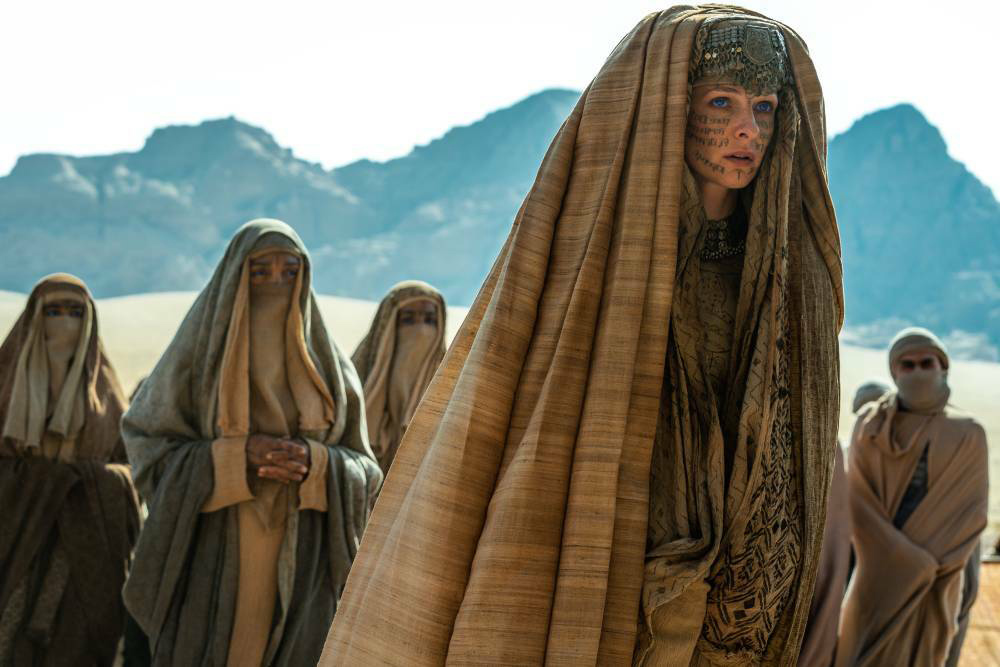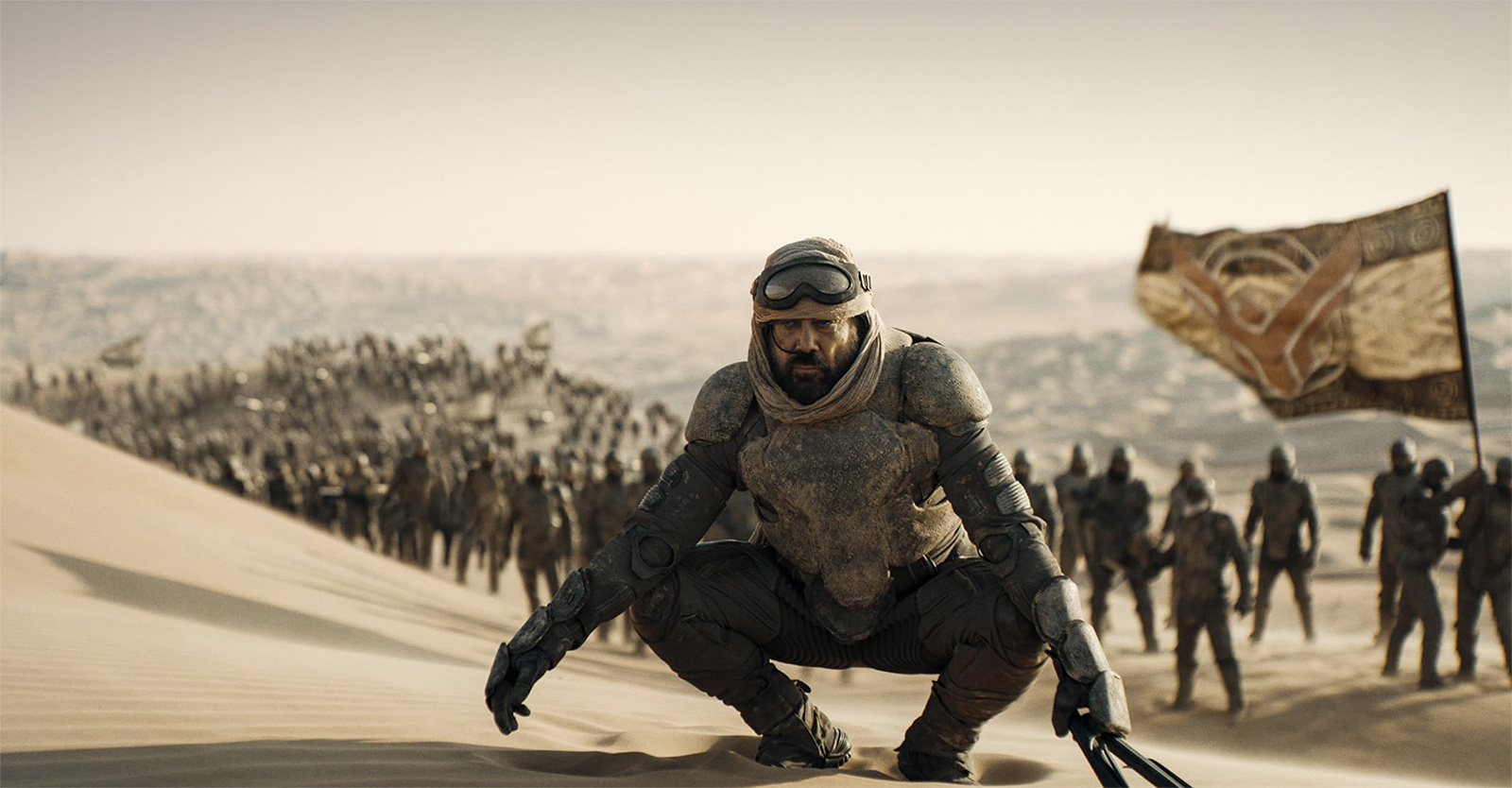(RNS) — Frank Herbert, the author of the “Dune” science fiction novels, once wrote that mixing religion and politics is a bit like riding in a cart headed off a cliff. By the time you’ve reached the edge, it’s too late.
Herbert’s maxim comes to mind in watching “Dune: Part Two,” the second installment of Denis Villeneuve’s adaptation of “Dune,” the first in Herbert’s legendary series. The film takes up the cautionary tale of young Paul Atreides’ transformation where the 2021 Part 1 left off, as the political fugitive hero is about to become a would-be messiah, with disastrous consequences.
Paul, played by Timothée Chalamet, rises to power among the Fremen (pronounced “frem-men”) who dwell in the deep deserts of the planet Arrakis by availing himself of local prophecies that centuries earlier foretold a messiah would come from the outside world. The divination came from the Bene Gesserit, an order of women with supernatural powers who control most of the universe’s politics.
At least one of the Fremen, a warrior named Chani, played by Zendaya, tells her community to beware, even though she and Paul have become lovers.
“This prophesy is how they enslave us,” Chani says. The Fremen, she argues, should save themselves rather than serve as someone else’s political tools.
With the help of his mother, Jessica, a former Bene Gesserit who has become a Fremen spiritual leader in her own right, Paul embraces the prophecies to seize power. The result is a political and military victory for Paul’s cause and the start of a holy war in his name aimed at universal conquest.

Actor Rebecca Ferguson as Lady Jessica, mother of Paul Atreides, in “Dune: Part Two.” (Photo © Warner Bros.)
Revenge and murder and mayhem follow, at the cost of Paul’s humanity and countless lives, a scenario that represents Herbert’s misgivings about religion and political messiahs.
“Don’t give over all of your critical faculties to people in power, no matter how admirable those people may appear to be,” the author wrote in an essay about the origins of “Dune.” “Beneath the hero’s facade, you will find a human being who makes human mistakes. Enormous problems arise when human mistakes are made on the grand scale available to a superhero.”
As if to drive the point home, most of the film’s religious figures are manipulative and power-hungry, while the true believers among the Fremen are portrayed as fools easily led astray.
Herbert’s warnings about the dangers of using religion as a political tool are apt at a time when religious nationalism and conflict are on the rise. Yet the film overlooked one of the series’ other lessons: “Nothing about religion is simple.”
The Fremen, in both Villeneuve’s films and Herbert’s novels, are many things: fierce, pious, intensely private, cruel, coldhearted, brutal toward outsiders, entirely without tact and ruthless when it comes to the scarce commodity of water, even siphoning water from the dead bodies of their friends and enemies alike.
They are also resourceful, having turned their planet’s feared giant sandworms into locomotives driving what is essentially a desert railway system. (The sight of the Fremen riding a sandworm in the films is a thrill for longtime fans of Herbert’s books, as well as newcomers.)

Actor Javier Bardem and Fremen in “Dune: Part Two.” (Photo © Warner Bros.)
They are not slaves, not to the Bene Gesserit, not to the Atreides family or any of the other ruling houses. (Imagine today’s mega-corporations run by old-school feudal lords, who claim to rule their world.) They rule their world’s entire southern hemisphere without interference from outsiders. They harass and drive off anyone who dares trespass on their territory anywhere else on Dune, despite lacking much of the technology and military hardware of those outsiders.
They do this in large part because of their religion, which gives them a fierce sense of pride, purpose and identity as the righteous people of their God, eager to reclaim all of their world. Outsiders may have inspired their beliefs, but the Fremen have made those beliefs their own, reshaping them to fit their world and turning them into a source of power.
Rather than enslaving them, their religion keeps the Fremen free and resistant to any attempts at outside control. They are not waiting for a savior. They are looking for signs that their time has come.
In Herbert’s novel, they choose Paul Atreides as their messiah, much as he chooses them, in hopes that he will help them finally oust the off-worlders who harass their communities and pollute their holy world with their sins. In the novel, in fact, the Fremen push Paul into becoming a messiah — over the warnings of his mother, who knows the perils of religion used to political ends.

Actors Timothée Chalamet and Zendaya in “Dune: Part Two.” (Photo © Warner Bros.)
“Dune: Part Two” misses this.
Focused on sermonizing about the dangers of political religion, the film turns the proud and fiercely independent Fremen into religious simpletons and puppets. Herbert’s original Fremen don’t fight for the lies of an outsider; they fight because they believe violence and fire can cleanse the world from evil.
Herbert knew the danger of using religion for political gain is not that outsiders will mislead the weak or uneducated or unsophisticated. The danger is that religion cannot be controlled — and that spiritual fire will often turn on those who seek to manipulate it and burn up the whole world in the process.
Those who play with that kind of holy fire do so at their peril.
(Bob Smietana is a national correspondent for Religion News Service. The views expressed in this commentary do not necessarily reflect those of RNS.)

